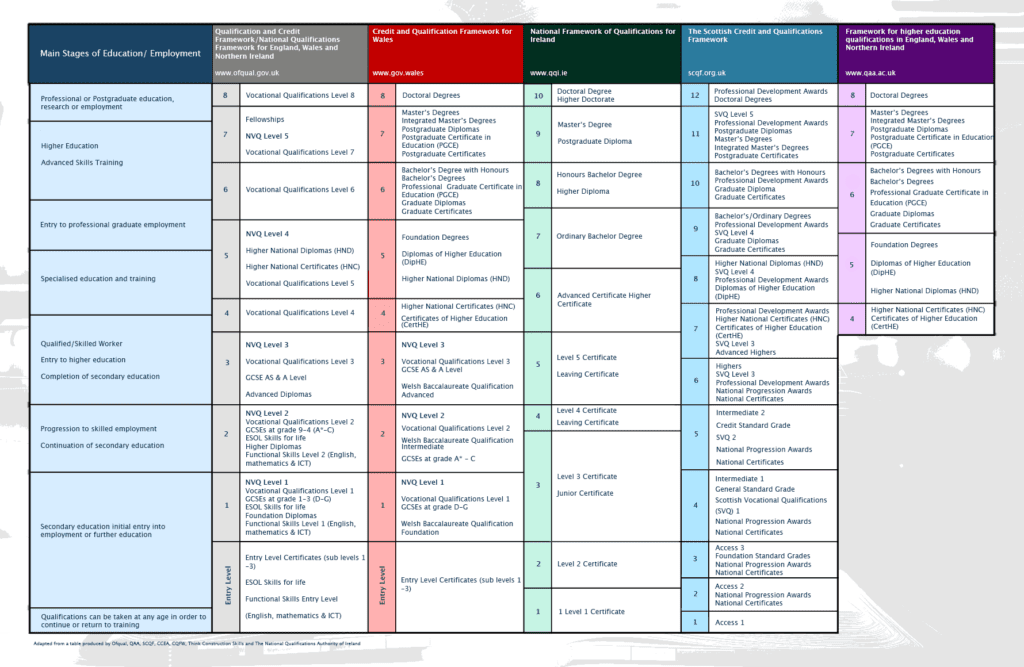Security is an incredibly diverse field, and it can be difficult to know how to progress within it.
However, with our career pathways section, you can find out how best to advance your career in our field.
Read on to find out more.
The security profession offers a wide range of opportunities, and there is no single path to success.
Whether you’re just starting out or transitioning from another field, this Career Pathways guide is designed to help you understand the various roles and stages in the sector.
It’s important to note that progression isn’t always linear—your skills, experience, and education play a crucial role in where you begin and how you advance.
Depending on your background, you might enter at any level, and previous levels are not strict prerequisites.
This flexibility reflects the dynamic nature of the security industry and the diverse routes professionals take to build fulfilling careers.
A Level 1 qualification in the UK is broadly equivalent to achieving a GCSE at grades D-G (or 1-3 in the new grading system). It also includes other qualifications like Level 1 functional skills, Key Skills level 1, and certain NVQS.
Level 1 security courses, often focusing on foundational knowledge and skills, are generally designed to equip individuals with the basic understanding needed to work in the private security industry, particularly as unarmed security guards. These courses typically cover topics such as understanding the private security industry, basic security procedures, and conflict management. They are often a prerequisite for obtaining an SIA (Security Industry Authority) licence and are the starting point for many security careers!
Types of Security Courses


A Level 2 qualification in the UK is broadly equivalent to GCSE grades 9-4 (or A*-C in the old grading system). It represents a foundational level of knowledge and skills, and serves as a stepping stone to further education or vocational training.
Level 2 Security Courses are the entry level foundation courses which security professionals use as a base to build on.
Types of Security Courses
A level 3 qualification is generally considered equivalent to A-Levels, AS Levels, and some vocational qualifications like NVQ Level 3s. It represents a higher level of knowledge and skill than Level 2 qualifications, often achieved in further education and training settings
Level 3 Security Courses build on the foundation level that is often achieved at level 2.
Types of Security Courses


A Level 4 qualification in the UK is equivalent to the first year of a bachelor’s degree and sits just above A-levels (Level 3) on the Qualifications Framework.
It signifies advanced learning and focuses on specialist knowledge and practical skills. These qualifications are often used for career progression, CV enhancement, and as a pathway to higher-level qualifications.
Types of Security Courses
A Level 5 qualification is typically equivalent to the second year of a full undergraduate degree and is often attained through programs like Foundation Degrees, Higher National Diplomas (HNDs), or Diplomas of Higher Education (DipHE).
These qualifications demonstrate strong knowledge and practical skills, preparing individuals for specific careers or further studies.
Types of Security Courses


A Level 6 qualification represents advanced learning, typically equivalent to a bachelor’s degree or a graduate diploma. It demonstrates a high level of knowledge and skills in a specific field and is often a stepping stone for further education or career advancement.
Types of Security Courses
A Level 7 qualification is generally equivalent to a Master’s degree or a postgraduate diploma. It signifies advanced knowledge and skills, often requiring a significant amount of independent study and research, like a dissertation or final project.
Examples of Level 7 qualifications include master’s degrees (MA, MSc), postgraduate diplomas, and some advanced diplomas and certificates.
Types of Security Courses


A level 8 qualification is typically a doctorate, such as a PhD or DPhil, and is the highest level of formal academic achievement. It represents the most academically challenging level and signifies expertise in a specific field.
Level 8 qualifications can also include certain Level 8 Awards, Certificates, and Diplomas.
Types of Security Courses

The security profession is a wide and varied profession with many different areas of work. A good starting point would be to check out our education pages Education and Learning – Security Institute which explains what protective security is and the protective security framework. Also review the content above that articulates the different qualifications and dertifications at different stages of education.
Find an apprenticeship using the link here.
We would advise you to talk to an experienced security professional who has gone through the ranks. If your qualification is at level 2, you may wish to look at accreditation opportunities at level 3 or 4 as part of your academic development. Additionally, joining a professional body like the Security Institute, where you network with like-minded individuals and attend developmental opportunities,s could be advantageous.
We would suggest that it is best to choose subjects that offer the widest range of opportunities in both the security and other professional fields. The core subjects of English and Maths are important, along with subjects that align with your personal career path, i.e. Biology for a Healthcare Profession, Physics for Engineering, etc. Technology will play an important role in future; therefore, Computer Studies, Design and Technology are good subjects to consider. We would suggest students talk to their in-school Career Advisor for more information and guidance.
If you are clear that you want to go into the military, police or intelligence service, then you can focus on working through the career pathway into these roles. If not, it may be best to train as a generalist in different areas of security, as the Level 4 Protective Security Adviser offers, which may clarify which area of security you would like to progress in.
No. The information above aims to provide an overview of the academic levels. You can therefore skip academic levels if you meet the entrance criteria for the level you are applying for.
There are different scholarships and bursaries that exist to support academic development. As the criteria and dates change, we would suggest carrying out an internet search using the words bursary or scholarship in your subject area. In addition to this, The Security Institute offers the Baroness Ruth Henig Scholarship Programme, which is a bursary programme for people who are interested in training and certification in security. More information can be found here: Education and Learning – Security Institute